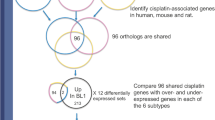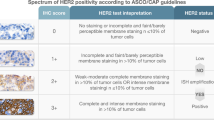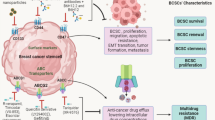Abstract
The primary objective was to determine if multi-omic molecular profiling (MMP) informed selection of approved cancer treatments could change the clinical course of disease for patients with previously treated metastatic breast cancer (MBC) (i.e., produce a growth modulation index (GMI) ≥1.3). GMI was calculated as the ratio of progression free survival on MMP-selected therapy/time to progression on last prior treatment. To meet the primary objective at least 35 % of the subjects should demonstrate a GMI ≥1.3. Secondary endpoints included determining the response rate (according to RECIST 1.1), the percent of patients with non-progression at 4 months, and overall survival in patients whose therapy is selected by molecular profiling and proteomic analysis. Eligible patients had MBC, with ≥3 prior lines of therapy. A multi-omic based approach was performed incorporating multiplexed immunohistochemistry, c-DNA microarray, and phosphoprotein pathway activation mapping by reverse phase protein array. MMP was performed on fresh core biopsies; results were generated and sent to a Treatment Selection Committee (TSC) for review and treatment selection. Three sites enrolled 28 patients, of which 25 were evaluable. The median range of prior treatment was 7 (range 3–12). The MMP analysis and treatment recommendation were delivered within a median of 15.5 days from biopsy (range 12–23). The TSC selected MMP-rationalized treatment in 100 % (25/25) of cases. None of the MMP-based therapies were the same as what the clinician would have selected if the MMP had not been performed. GMI ≥1.3 was reported in 11/25 (44 %) patients. Partial responses were noted in 5/25 (20 %), stable disease in 8/25 (32 %) and 9/25 (36 %) had no progression at 4 months. This pilot study demonstrates the feasibility of finding possible treatments for patients with previously treated MBC using a multiplexed MMP-rationalized treatment recommendation. This MMP approach merits further investigation.


Similar content being viewed by others
References
Armstrong DK (2002) Relapsed ovarian cancer: challenges and management strategies for a chronic disease. Oncologist 7(Suppl 5):20–28
Moroney J, Wheler J, Hong D, Naing A, Falchook G, Bodurka D, Coleman R, Lu K, Xiao L, Kurzrock R (2010) Phase I clinical trials in 85 patients with gynecologic cancer: the M.D. Anderson Cancer Center experience. Gynecol Oncol 117(3):467–472. doi:10.1016/j.ygyno.2010.02.008
Janku F, Tsimberidou AM, Wang X, Hong DS, Naing A, Gong J, Garrido-Laguna I, Parsons HA, Zinner RG, Kurzrock R (2011) Outcomes of patients with advanced non-small cell lung cancer treated in a phase I clinic. Oncologist 16(3):327–335. doi:10.1634/theoncologist.2010-0308
Bailey CH, Jameson G, Sima C, Fleck S, White E, Von Hoff DD, Weiss GJ (2012) Progression-free survival decreases with each subsequent therapy in patients presenting for phase I clinical trials. J Cancer 3:7–13
http://www.cancer.gov/cancertopics/druginfo/breastcancer. Accessed Oct 2013
Von Hoff DD, Stephenson JJ Jr, Rosen P, Loesch DM et al (2010) Pilot study using molecular profiling of patients’ tumors to find potential targets and select treatments for their refractory cancers. J Clin Oncol 28(33):4877–4883. doi:10.1200/JCO.2009.26.5983
Tsimberidou AM, Iskander NG, Hong DS, Wheler JJ et al (2012) Personalized medicine in a phase I clinical trials program: the MD Anderson Cancer Center initiative. Clin Cancer Res 18(22):6373–6383. doi:10.1158/1078-0432.CCR-12-1627
Wang F, Wang S, Wang Z, Duan J, An T, Zhao J, Bai H et al (2012) Phosphorylated EGFR expression may predict outcome of EGFR-TKIs therapy for the advanced NSCLC patients with wild-type EGFR. J Exp Clin Cancer Res 31:65. doi:10.1186/1756-9966-31-65
Emery IF, Battelli C, Auclair PL, Carrier K, Hayes DM (2009) Response to gefitinib and erlotinib in non-small cell lung cancer: a restrospective study. BMC Cancer 9:333. doi:10.1186/1471-2407-9-333
Jegg AM, Ward TM, Iorns E, Hoe N, Zhou J, Liu X, Singh S, Landgraf R, Pegram MD (2012) PI3K independent activation of mTORC1 as a target in lapatinib-resistant ERBB2+ breast cancer cells. Breast Cancer Res Treat 136(3):683–692. doi:10.1007/s10549-012-2252-9
Bostner J, Karlsson E, Pandiyan MJ, Westman H, Skoog L, Fornander T, Nordenskjöld B, Stål O (2013) Activation of Akt, mTOR, and the estrogen receptor as a signature to predict tamoxifen treatment benefit. Breast Cancer Res Treat 137(2):397–406. doi:10.1007/s10549-012-2376-y
Wulfkuhle JD, Berg D, Wolff C, Langer R, Tran K, Illi J, Espina V, Pierobon M et al (2012) Molecular analysis of HER2 signaling in human breast cancer by functional protein pathway activation mapping. Clin Cancer Res 18(23):6426–6435. doi:10.1158/1078-0432.CCR-12-0452
Wulfkuhle JD, Speer R, Pierobon M, Laird J, Espina V, Deng J et al (2008) Multiplexed cell signaling analysis of human breast cancer applications for personalized therapy. J Proteome Res 7(4):1508–1517. doi:10.1021/pr7008127
Petricoin EF 3rd, Bichsel VE, Calvert VS, Espina V, Winters M et al (2005) Mapping molecular networks using proteomics: a vision for patient-tailored combination therapy. J Clin Oncol 23(15):3614–3621
Silvestri A, Calvert V, Belluco C, Lipsky M, De Maria R, Deng J et al (2013) Protein pathway activation mapping of colorectal metastatic progression reveals metastasis-specific network alterations. Clin Exp Metastasis 30(3):309–316
Chia S (2012) Testing for discordance at metastatic relapse; does it matter. J Clin Oncol 30(6):575–576. doi:10.1200/JCO.2011.36.6385
Amir E, Miller N, Geddie W et al (2012) Prospective study evaluating the impact of tissue confirmation of metastatic disease in patients with breast cancer. J Clin Oncol 30(6):587–592. doi:10.1200/JCO.2010.33.5232
Niikura N, Liu J, Hayashi N et al (2012) Loss of human epidermal growth factor receptor 2 (HER2) expression in metastatic sites of HER2-overexpressing primary breast tumors. J Clin Oncol 30(6):593–599. doi:10.1200/JCO.2010.33.8889
Kümler I, Brünner N, Stenvang J, Balslev E, Nielsen DL (2013) A systematic review on topoisomerase 1 inhibition in the treatment of metastatic breast cancer. Breast Cancer Res Treat 138(2):347–358. doi:10.1007/s10549-013-2476-3
Awada A, Garcia AA, Chan S, Jerusalem GH, Coleman RE, Huizing MT, Mehdi A, O’Reilly SM, Hamm JT, Barrett-Lee PJ, Cocquyt V, Sideras K, Young DE, Zhao C, Chia YL, Hoch U, Hannah AL, Perez EA, NKTR-102 Study Group (2013) Two schedules of etirinotecan pegol (NKTR-102) in patients with previously treated metastatic breast cancer: a randomised phase 2 study. Lancet Oncol 14(12):1216–1225. doi:10.1016/S1470-2045(13)70429-7
Hoch U, Fry DG, Chia YL, Caygill K, Hannah AL, Perez EA, Cortez J, Awada A, O’Shaughnessy J, Twelves C, Rugo HS, Im S-H, Xu B, Anderes KL, Davis DW (2013) Etirinotecan pegol (EP) target-specific pharmacodynamic (PD) biomarkers measured in circulating tumor cells (CTCs) from patients in the phase III BEACON study in patients with metastatic breast cancer (mBC). J Clin Oncol 31:2318 [(suppl; abstr 1087). 2013 ASCO Annual Meeting]
http://www.standup2cancer.org/press_release/view/stand_up_to_cancer_and_melanoma_research_alliance_announce_dream_team. Accessed 2 Jul 2014
Acknowledgments
The authors thank the patients and their families who participated in this clinical trial and the Side-Out Foundation. The Side-Out Foundation sponsored and provided the funding for the study. Side-Out Foundation and TD2 were responsible for the study design. TD2 coordinated the collection, monitoring, management, interpretation, and analysis of the data. The corresponding author (GSJ) had full access to all the data in the study and final responsibility for the decision to submit for publication. This trial is registered with ClinicalTrials.gov, number NCT01074814.
Conflict of interests
Gayle Jameson reports grants from Side-Out Foundation and serves in a Consultant/Advisory role with Celgene. Dr. Petricoin reports grants from Side-Out Foundation, during the conduct of the study; University, personal fees from Perthera, Inc., outside the submitted work; In addition, Dr. Petricoin has a patent Methods for the Isolation and Analysis of Cellular Protein Content 6,969,614 with royalties paid, and a patent mTOR pathway Theranostic US8628931 B2 pending and Stock ownership: Theranostics Health, Inc. and Pethera, Inc. Dr. Sachdev reports grants from Celgene, grants from Pfizer, drug support from Genentech and advisory board payment from Celgene outside the submitted work. Dr. Liotta reports personal fees from Theranostics Health, Inc., outside the submitted work; and stock ownership: Theranostics Health. NIH royalty fees received for Analysis of Cellular Protein Content6,969,614, and Laser Capture Microdissection 5,843,644; 5,843,657;6,010,888; 6,204,0030; 6,251,516. Dr. Loesch reports personal fees from Caris Life Sciences, during the conduct of the study. Dr. Anthony reports personal fees from Caris Life Sciences, during the conduct of the study. Dr. Chadha declares that she has no conflict of interest. Dr. Wulfkuhle reports Stock Ownership: Theranostics Health. Rosa Gallagher reports grants from Side Out Foundation, during the conduct of the study. Kimberley Reeder reports grants from Side-Out Foundation, during the conduct of the study. Dr. Pierobon reports grants from Side-Out Foundation, during the conduct of the study; Stock Ownership: Theranostics Health, serves in a Consultant/Advisory role with Perthera. Monica Fulk declares that she has no conflict of interest. Nina Cantafio reports personal fees from Translational Drug Development LLC (TD2), during the conduct of the study; and previous contract work with Caris Life Sciences. Brian Dunetz reports Employment Position- Chief Operating Officer Side Out Foundation, uncompensated. Dr. Mikrut reports personal fees from Translational Drug Development LLC (TD2), during the conduct of the study. Dr. Von Hoff reports personal fees from Caris Life Sciences, as Director of Clinical Research during the conduct of the study and Stock Ownership: Caris Life Sciences. Dr. Robert reports grants from Side-Out Foundation, during the conduct of the study.
Author information
Authors and Affiliations
Corresponding author
Electronic supplementary material
Below is the link to the electronic supplementary material.
Rights and permissions
About this article
Cite this article
Jameson, G.S., Petricoin, E.F., Sachdev, J. et al. A pilot study utilizing multi-omic molecular profiling to find potential targets and select individualized treatments for patients with previously treated metastatic breast cancer. Breast Cancer Res Treat 147, 579–588 (2014). https://doi.org/10.1007/s10549-014-3117-1
Received:
Accepted:
Published:
Issue Date:
DOI: https://doi.org/10.1007/s10549-014-3117-1




